The Epic of Gilgamesh – History’s Oldest Great Work of Literature

In 1853, a great discovery was at the site of ancient Nineveh in modern-day Iraq, near Mosul. A team of British and Assyrian archaeologists uncovered a series of stone tablets, engraved in the Akkadian language, and dated to 1300-1000 BC.
On these tablets is perhaps the oldest recorded narrative known to man. Since 1853, older versions of the story have been found, written perhaps 3,000 years ago in Sumerian — showing that the story had survived the downfall of one empire and the rise of another, and had continued in popularity across cultures.
This is the “Epic of Gilgamesh”, a story which in many ways laid the foundations of the “buddy” story, and may have been the inspiration behind Homer’s “Iliad”, written hundreds of years later in Greece.

Neo-Assyrian clay tablet. Epic of Gilgamesh, Tablet 11.
The story follows Gilgamesh, a young and handsome Uruk. Gilgamesh was the son of Ninsun, a goddess, and Lugalbanda, a priest-king. Wanting for nothing, he grew up spoiled, arrogant and cruel. He spends his time beating the other men of Uruk in fights and taking many women to bed, including the wives of other men – as royalty and the son of a goddess, he feels he is entitled.
The people of Uruk, terrorized by Gilgamesh, and unable to do anything because of his royal and divine status, cry out to the king of heaven, Anu, to help them with the young king.
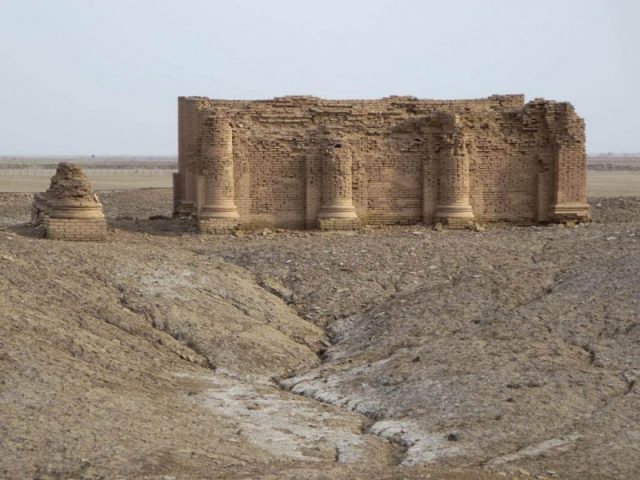
The Parthian Temple of the Gareus at Uruk (Warka), 39 km east of Samawah, Iraq, was built before 110 AD and is thus thousands of years younger than the surrounding Sumerian remains. Photo by David Stanley CC BY 2.0
In response, the gods send Enkidu, a wild man who lives in the desert, to Uruk. Enkidu lives in the wilds, side by side with the animals when he encounters a priestess named Shamhat, who partially civilized him – she teaches him how to eat like a human being. Enkidu then heads to Uruk.
There, he meets Gilgamesh and challenges him to a fight. They fight day and night, but eventually Gilgamesh wins. However, in the process, he begins to learn humility and becomes best friends with Enkidu.
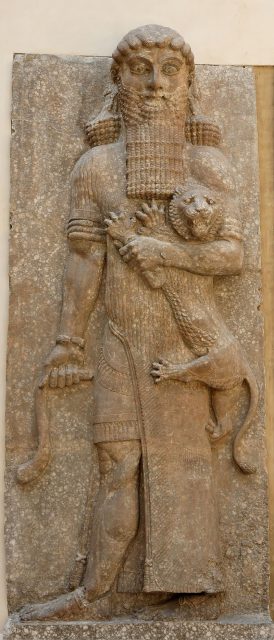
Possible representation of Gilgamesh as Master of Animals, grasping a lion in his left arm and snake in his right hand, in an Assyrian palace relief, from Dur-Sharrukin, now held in the Louvre.
The pair then decide to go on a great adventure. First, they go to the “Forest of Cedar” (which may be today’s Lebanon, known for its cedar trees), and fight the monster Humbaba, which the gods have set over the forest.
They then encounter Ishtar, the goddess of love, war and sex, and who reputedly can seduce any man alive – but not Gilgamesh, who rejects her advances.

Fragment of a stone plaque from the temple of Inanna at Nippur showing a Sumerian goddess, possibly Inanna (c. 2500 BC). Photo by Wolfgang Sauber CC BY-SA 3.0
This angers the goddess, who then asks a fellow deity to release the mighty “Bull of Heaven” so it can attack and kill Gilgamesh.
This he does, but Gilgamesh and Enkidu team up and kill the Bull after a mighty struggle. This angers all of the gods, for the Bull is their mightiest creature, and as punishment, they cause Enkidu to die of the injuries sustained in the fight. Gilgamesh almost dies of grief at the loss of his friend.
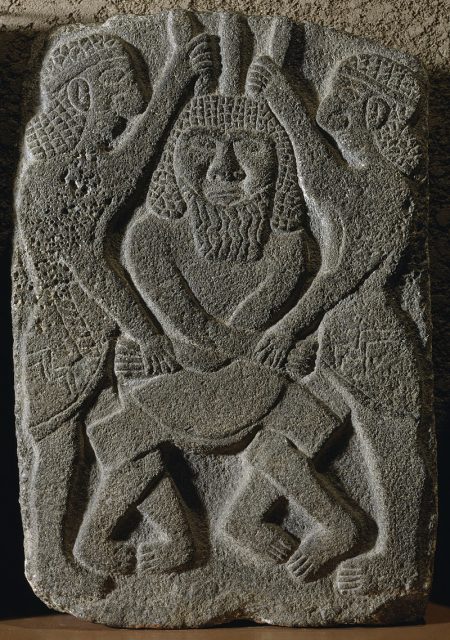
This relief decorated the lower course of the exterior wall of the temple palace of King Kapara. Two heroes pin down a bearded foe, while grabbing at his pronged headdress. The context may be related to the Gilgamesh epic, and display Gilgamesh and Enkidu in their fight with Humbaba.
The death of Enkidu not only wounds Gilgamesh but causes him to worry about his own immortality. He begins a search to find the secret of eternal life.
He looks for a man named Utnapishtim, who is reputed to be immortal, and survived a great flood which overtook the world many years before.
After much searching, Gilgamesh finds Utnapishtim, who tells the future king that he must accept his mortality, which he does. Gilgamesh then returns to Uruk, where he rules as a good and wise king for 126 years.

This small 11 x 9.5 x 3 cm clay tablet is a fragment of tablet V of the Epic of Gilgamesh. It narrates how Gilgamesh and Enkidu entered the Cedar Forest and killed Humbaba and his seven sons. Photo by Osama Shukir Muhammed Amin FRCP(Glasg) CC BY-SA 4.0
It seems there really was a Gilgamesh, as other archaeological finds in the form of letters and inscriptions indicate. He must have been an outstanding personality, for archaeologists believe this king is the basis of the epic tale.
Gilgamesh is not just a story about a king. It is one of the first times that human beings recorded some of the great themes of human life and literature. Friendship, hatred, the fear of death and the search for everlasting life, the relationship of humans to the gods, the relationship between male and female, city versus rural life, the value of humility, the cost of arrogance and much more.
The adventures and hardship that Gilgamesh endures in the story serve to change him and make him a wiser man so that he might be a good king, a theme which has existed for centuries – Gilgamesh may have been the first.
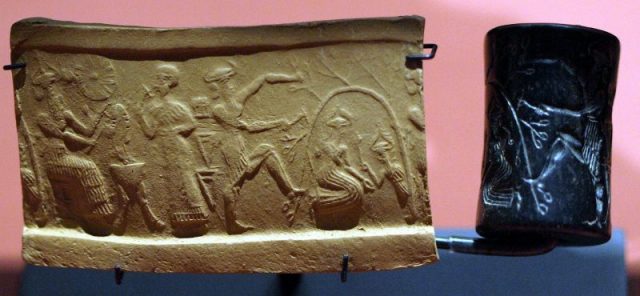
Akkadian cylinder seal impression from Girsu (c. 2340 – 2150 BC) showing a mythological scene. The figure in the center appears to be a god, perhaps Gilgamesh, who is bending the trunk of a tree into a curve as he chops it down. Underneath the tree, a god ascending from the Underworld hands a mace-like object to a goddess. Photo by Applejuice CC BY-SA 4.0
Many historians believe that the Utnapishtim story in the epic was a forerunner of the Flood of the Old Testament, and even many Biblical scholars agree that the Noah narrative and Gilgamesh likely recount the same event – a tremendous flood in Mesopotamia.
There are other similarities between Gilgamesh and stories in the Bible. Firstly, in both the Epic and in Ecclesiastes, the advice “a triple-stranded rope is not easily broken” is found in both books.
In the Epic, Enkidu is created by the gods out of the soil in the wild. Shamhat not only offers the wild man food and teaches Enkidu how to eat, but tempts him sexually.
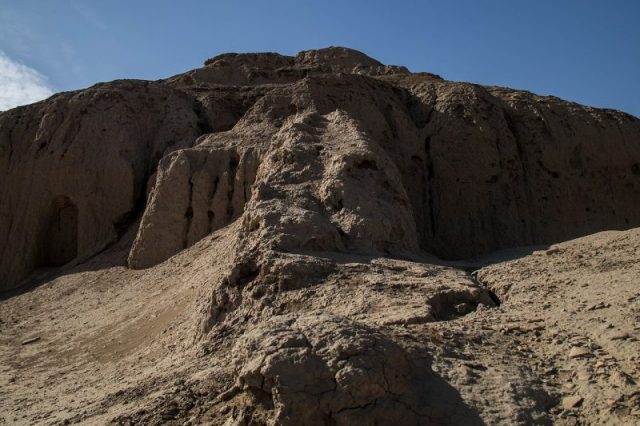
Uruk Photo by Osama alqasab CC BY-SA 4.0
Enkidu resists her advances, realizes his nakedness, and is expelled from the wild, much like the biblical Adam. There is also a snake in the Epic which later steals the secret of immortality (in the form of a plant) from Gilgamesh.
In other parts of the tale, a goddess was created from the rib of the god Enki, god of creation. One scholar believes that King Nebuchadnezzar’s madness in the Bible’s story of Daniel was inspired by the story of Enkidu, the wild man.
Many historians believe that the Epic of Gilgamesh had an influence on the Greek author Homer. They see similarities in the tragedies of the Iliad and the journeys of the Odyssey to the Epic of Gilgamesh.
The story of Gilgamesh and Enkidu even made its way into the 20th century. In an episode of Star Trek: The Next Generation, Captain Picard relates the story of Gilgamesh and Enkidu to an alien captain as a way of relating to the quest they find themselves on together.


Necessary education, thank you very much. Counters the 'everything we know is a lie' condition we are living today. Thanks, again.
ReplyDeleteNow let's do some Flat Earth, the Dome, let's really give humanity some hope.
Writing arrives at the knowledge through the heart or emotions. Its enthusiastic and levelheaded intrigue essentially rouses us. Writing is the language of reason, while verse is the writing of feeling.webinar definition
ReplyDelete